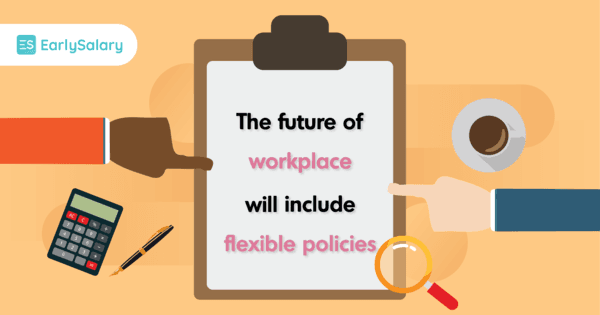The Future Of Workplace Will Include Flexible Policies
Reviewed by: Fibe Research Team
- Updated on: 10 Apr 2023
Reviewed by: Fibe Research Team

Highlight: While the whole world is in the process of unlocking and returning back to normal, it seems that the idea of having flexible policies at work is here to stay. Here’s how.
The entire world was forced to adopt a remote working model in wake of the COVID 19 pandemic and the subsequent lockdown. And while initially, the idea of remote working was met with a little resistance on account of lack of technology or even on account of the fact that simple task like taking advice from your colleague or coordinating a team meeting seemed like a task, once work from home became a norm, it ushered in a new era of productivity, convenience, and ease of doing business. The flexible policies adopted during the COVID 19 pandemic opened a whole new dimension for managing the future of the workplace.
Now that the remote working model has been well adopted by almost all organisations in the most comprehensive manner possible, even with the relaxation of the social distancing rules, remote working may be a crucial part of the normal work model of a lot of organisations.
In fact, according to a report by World Economic forum, ‘companies like Google, Salesforce, Facebook and PayPal are among the big companies extending remote working to at least next summer, while Japanese tech firm Fujitsu is halving its office space and giving its 80,000 employees in the country unprecedented flexibility.’
The shift to remote working has benefitted both the employers and the employees- while the employers cut down on office maintenance expenses, employees have not only been enabled to achieve a healthy work-life balance, it has also positively impacted on their view of the company. It is clear as day that flexible workplace policies are not only the need of the hour but also may be the solution for a lot of managerial and policy-related problems.
While the whole world is in the process of unlocking and returning back to normal, it seems that the idea of working from home is here to stay. In fact, according to the PwC’s Remote Work Survey, as many as 69 percent of the companies expect almost two-thirds of their workforce to be working from home once a week in the future as a permanent feature. Here is why having flexible policies in the workplace are a good idea in the times to come:

Having flexible policies for the workplace would bring about an evolution in the leadership styles as well as it would do away with the mandate of ‘presenteeism’ at the workplace and would be replaced by a Trust-based working. The latter would do away with the conventional requirements of a 9 to 5 job and would assess the employee on their output in work.
TBW use in Germany across the productivity distribution
As can be seen from the image above, this flexible working policy has a positive impact on the productivity of the employee, which benefits both the employer and the employees.
Flexible policies have proven to positively impact employee development on a personal as well as professional level. In fact, a per study concluded by Stanford University found that productivity gains nearly doubled when employees had a choice as to where they worked and how they worked.
On a personal level, it enables the employees to have a better work-life balance as they can spend the time they spend commuting and during breaks in the office with their family. In addition to that, they can also spend the extra time they now have on upskilling their skills in diverse fields which help not only the employee themselves but also the employer and the economy at large as well.
While flexible policies at the workplace seem like a good idea, they come with their fair share of logistical and practical problems. In a report by Mckinsey and company, it was found that few kinds of work are better done in a natural setting and not virtually. “Negotiations, critical business decisions, brainstorming sessions, providing sensitive feedback, and onboarding new employees are examples of activities that may lose some effectiveness when done remotely.”
Even though a more flexible approach to workplace policies may come with its own pros and cons, a general trend in its favour is clearly apparent. In fact, according to a Mercer and AECOM survey, as many as 56 percent of employees said they would consider switching employers if increased flexibility were not offered post-pandemic.
Even though we all were rushed into the idea of remote working due to the COVID 19 pandemic hitting the unsuspecting world, its associated advantages make it a logical choice for the future of the workplace!
Download the personal loan app here, or simply log in to our website and be a part of the #OneSmallStep experience.